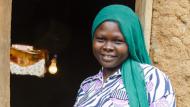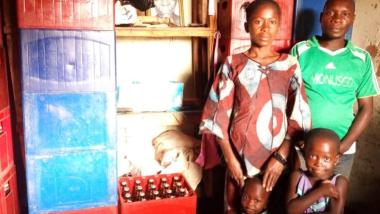In the United States, women run 30 percent of small businesses – but only 2.2 percent of all venture capital invests in businesses where women are the founders. Despite women driving most consumer purchasing, when it comes to becoming a successful entrepreneur, they continue to face barriers.
In countries affected by conflict, women face even greater challenges in starting and growing their own businesses, due to a combination of insecurity, high poverty rates, and strong traditional gender norms.
Across every community where we work – from Afghanistan, to Kosovo, to South Sudan – there’s a common theme: land, livestock and other assets with economic value are overwhelmingly owned and controlled by men, who pass them from father to son. Using their property as collateral, men can more easily access the capital and credit needed to start a business. They are also much more likely to receive education and training in the skills they need for business, such as technical and vocational skills, literacy, and numeracy.
Meanwhile, women traditionally take on the burden of unpaid, domestic work, such as caring for children, cooking, and fetching water. They tend the land and grow food to feed their families – women make up almost 50 percent of the agricultural labor force in sub-Saharan Africa and produce 70 percent of its food. This leaves women with less time to engage in business. With women and girls less likely to complete school, inherit land, or own money, they also have far fewer resources and opportunities to start their own enterprises.
Despite these obstacles, the women we serve seize opportunities to become economically self-sufficient and support their families. And with the right training, investment, and support networks, women have shown that they can thrive as entrepreneurs and business owners, creating sustainable profits and growth that benefits whole communities.
In some of the most challenging environments, our program graduates’ businesses are feeding families, sending children to school, creating jobs and strengthening local economies. We’re committed to giving more women the tools they need to make their start-ups succeed.
For World Entrepreneurs’ Day, we’re celebrating some recent success stories from businesswomen in Rwanda, DRC and Nigeria.
Geraldine
Rwanda, Avocado Seller
After giving birth to twins, I contracted tuberculosis (TB). I received treatment and was cured, but it came back after a few months, and this time my husband was also diagnosed. Neither of us could work, and our family’s wellbeing was severely affected. A few years later, I was still in isolation as the TB was resisting treatment—I found out that I was pregnant and was so depressed. We were so poor, and all suffering.
I knew that my family’s poverty was due to illness, not laziness, and so when Women for Women International invited me to join their 12-month program, I knew I could use the opportunity to lift up my family.
I invested my monthly training stipend in selling avocados... I now sell 50 kg of avocados each week.
I have invested my monthly stipend from Women for Women International in selling avocados. We learned business skills, which has helped me to do bookkeeping for my business—and it is flourishing.
I now sell 50 kg of avocados each week, making a profit of 8,000 Rwandan Francs (RWF - approximately $9). I have saved 40,000 RWF ($44) in a bank account and can now pay for medical insurance for my family. I have also joined two savings groups, and in the future, I want to start a new business selling cows.
Aisha
Nigeria, Poultry Farmer
Before Women for Women International, I was not earning any income of my own. My vocational choice through the program was poultry rearing. I used part of my training stipend to start a poultry business from the house, which is now thriving.
I earn enough to provide for my children, and we have learned how to have a healthier life. I bought seven birds which I sold for a profit and am now expanding my poultry business so that I can further support my family’s needs.
I will be truly fulfilled to see my children, especially my girl, educated up to university level.
I have started making plans for that—I have bought a calf with part of my training stipend and proceeds from the sale of one of my goats. I am rearing the calf which I will sell in the future and use the proceeds to support my children’s education.
Sukari
Democratic Republic of Congo, Milk and Yogurt Producer
Before joining the program, my husband and I used to have a small business selling yogurt and milk, however we struggled to make it grow. As part of the training I learned how to do a self-evaluation, and I found that things where not working as I thought – we weren’t making enough to cover our family’s needs.
Since joining the program, I have noticed big changes in my life and my family. My class formed a savings and loans group and I started saving weekly, with the objective of taking out a loan to invest in my milk business.
Soon I was approved for a loan of 240,000 Congolese Francs (FC - approximately $145). I invested 100,000 FC ($60) in a supply of beer to sell, and the rest I used to increase my milk production.
Today I have profits of 270,000 FC ($163), I have paid off all my debts and my business is secure. I am able to pay for my children’s school fees, medical bills, and food for the family.
My relationship with my husband has become stronger and I am respected in my community.
Hassana
Nigeria, Nono Producer
My herdsman husband used to be gone for up to a year at a time looking for new grazing pastures, and it became difficult to support myself and our four children.
I made up my mind to earn my own money selling nono (a locally fermented cow’s milk)—making enough profit to buy what we needed until my husband returned. When he did, he tried to stop me from selling the milk, but then he fell sick and had to stop work, and so my co-wife and I took on the responsibility of family finances.
I joined Women for Women International’s program, and began saving some of my training stipend to expand my nono business, selling 10 gourds’ worth of nono a day.
My husband now sees the need for a woman to be financially independent and encourages me to keep attending Women for Women International classes each week.
With my income I became able to pay for some of my children’s school fees and have contributed to my first daughter’s marriage. I have also changed the roof of our house from thatch to zinc and can now sleep comfortably without rain falling on me or my belongings.
*For privacy reasons, representative photos have been used for Geraldine's and Aisha's stories. All the women pictured are graduates of Women for Women International's program.


